My mother always said, “Prevention is better than any cure”, and I’ve been thinking about that more now than ever. It just makes sense. This should always be kept in mind, but even more so when you’re traveling.
I remember the time where I had a trip to Vegas planned and got a cold three days before I was due to leave. It was too late to get a refund on the accommodations and flights, so I decided to just go. Looking back, that was a bit selfish, but luckily I got over it before I even left. Big thanks to Mother’s old secret family cure: Vitamin C, chicken soup, and lots of sleep.
There is honestly no better way to enjoy a vacation than being and staying healthy, relaxed and stress-free. Here are some basic, but significantly important, tips to not getting sick while on vacation. Some are no-brainers, but still deserve an honorable mention.
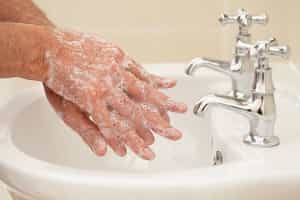
Wash & Sanitize Your Hands Frequently
This might sound like basic common sense, but this is probably one of the most important things to do to stay healthy when out and about. Many viruses and germs can stay alive on objects and surfaces for days, so if you touch them you have the possibility of catching it yourself.
Hand hygiene is essential to stop the spread of diseases and can dramatically reduce your chances of contracting certain germs yourself. Not keeping your hands clean can result in unpleasantries like diarrhea, nausea, vomiting, food poisoning, gastroenteritis, flu, norovirus, MRSA, or even hepatitis A, just to name a few.
If you’re stuck at a place that’s lacking in a washroom or soap, hand sanitizer and alcohol wipes are good for back up. They are not, however, a full replacement for good old-fashioned soap and water. When you are washing your hands, make sure to wash them for at least 30 seconds in warm to hot water, and if you have long nails, make sure to scrub under them, too. They can harbor foreign bacteria, too.
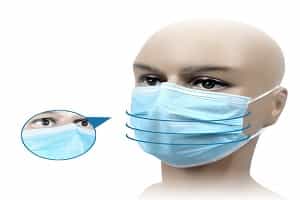
Wear A Medical Face Mask
Now, let me elaborate about wearing a medical face mask. How and when should you wear a mask? Given the current state of things, it may seem like it’s always a good idea, but right now they should be available for our doctors and nurses.
Typically, when we’re not going through any type of health crises, you would want to wear a mask if you are coughing, sneezing or going to be around a bunch of people who may or may not be sick (like on a crowded bus or airplane, for example). Otherwise, if you are healthy, it is not really necessary to wear one.
Masks are very effective, but only when used in combination with frequent hand-washing. Now if you really want to wear a mask then you must know how to properly use and dispose of it. First, make sure you wash and disinfect your hands before even touching the mask. Then you will want to cover all the way from your nose down to your chin. You must always avoid touching the mask while using it, but if you do end up touching it, since we all know how impossible it is to avoid touching your face, wash your hands immediately.
If you’re planning to wear these masks full time, you will need to remember to replace it with a new one if and when it gets damp. Do not ever reuse a single-use mask. Make sure to remove the mask from behind or by touching only the elastic ear loops and dispose of it in a trash bin immediately after use and then wash your hands before putting on a new one.
As you can see the most significant part is washing your hands, and washing them well. Even if you are just inside your home or traveling locally to run errands, like going to the grocery store or getting gas (think of all the germs and bacteria on a gas pump), wash your hands as many times as you can throughout the day, just to be safe.
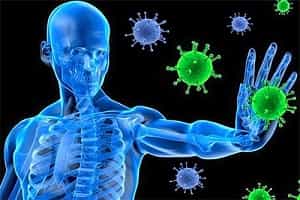
Boost Your Immune System
First it’s important to understand how your immune system works. I’m definitely no doctor, but basically your immune system is in charge of recognizing the difference between your body’s cells and alien or foreign cells. By knowing the difference it allows your immune system it to destroy anything that enters into your body that could be potentially harmful.
The main purpose of your immune system is to protect your body from viruses and bacteria. Without it, they’d have free reign and you’d be constantly ill. A properly functioning immune system helps you go about daily life as you come into contact with germs and bugs from pets, other people, and your environment. Without it, you could easily pick up infections, diseases, bacteria or even fatal viruses.
Your physical barriers (your skin for example) are your body’s first line of defense, but if viruses and bacteria manage to break through, say through a cut or through your nose or mouth, there are specialized cells that will jump into action. If you’ve got a healthy immune system, look after it and it will look after you.
Boosting your immune system starts at your kitchen. Eating and maintaining a healthy diet, including large servings of fruits and vegetables and other foods packed with vitamins and nutrients play a huge role in boosting your immune system. If there are certain foods or nutrients you are not getting enough of, then you should supplement it by taking vitamins and minerals, like vitamin A, B6, C, D, Zinc, probiotics and more. These are readily available at any major grocery store or pharmacy.
Making sure to get good sleep, maintaining a healthy exercise regimen, and keeping yourself hydrated all play a significant role in keeping a healthy immune system, too.
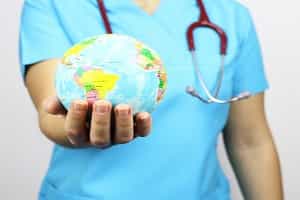
Make An Appointment With Your Doctor
When planning a vacation, you should also plan to check out your health before you leave. This is especially true if you’re planning an international getaway. It is recommended to visit your physician and get a full physical and check up at least a week or two before departing.
You should discuss your travel plans and get any vaccines that are recommended by your doctor. Keep in mind that some vaccines may take weeks before it starts working, so you should do a bit of research yourself online to determine when you should make an appointment.
Not all vaccinations are required for every individual for every trip, and a lot depends on what vaccinations you have already gotten in the past, what country or region you are planning to visit, and other individual factors, such as your personal medical history, how long you will be traveling, and what you will be doing, too.
It is also a must to find out if there are any outbreaks or other health risks in the area you are planning to travel to. You can check the Centers for Disease Control and Prevention (CDC), the World Health Organization (WHO), and the NHS’s Fit For Travel site to find out where any current outbreaks are.
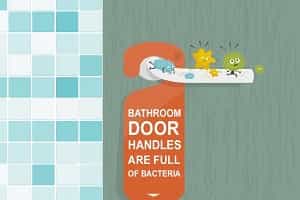
Be Mindful Of What You Touch
This is the crucial time to keep disinfectant wipes handy. You have to be weary and, yes, even exaggerated in keeping cleanliness a top priority. No one should judge you for that, and many may even be grateful. Start with dirty handles for any door you have to touch to get into places. You should either sanitize it before touching it or you can sanitize your hands after.
One big tip would also be to inspect, or even just bring your own silverware, when you eat out. If you’re on vacation chances are you’re not going to be cooking every meal you eat inside your condo or hotel. When you eat out at a restaurant there’s no way to be 100% sure how well your utensils were washed or who used it before you. Public utensils are also a common ground for all types of viruses and bacteria, so if they weren’t washed or sanitized well, you could be at risk.
Also, make sure to wipe the whole seat and handles before you sit down. Using public restrooms is already gross enough, but if you have to go you have to go. Try to avoid touching as many surfaces as possible including the sink, the doors, and other things inside it. Luckily, we now have many automatic sensor faucets and paper towel dispensers
Money, as sad as it may sound, is filthy. Paper money can harbor thousands of microbes from every environment it touches. It reportedly carries more germs than a household toilet. It can also transport a live flu virus and other pathogens for up to 3 weeks! Now would be a good time to switch to using debit and credit cards, and avoid handling cash and coins as much as possible.
Gadgets, like cellphones, laptops, tablets, and other handheld devices are also a big host to bacteria and viruses. If you, or others that handle the devices, don’t take care to wash their hands before touching their gadgets or if it is put down on an infected surface, you run the risk of contaminating it with a multitude of germs and bacteria, so make sure to take extra care for your gadgets and give them a wipe down every now and then with a disinfectant wipe.

Cleanliness Is Key!
Basically, you either need to sanitize all the things you touch or take special care to keep your hands clean before touching your nose, mouth or food. Keeping a small bottle of sanitizer on you is a good start. This is not only to help protect yourself, but it’s especially important to help care for your loved ones, too.
We all need to work together, especially now, to ensure we keep a clean and virus-free environment, at least as much as possible. It may sound easy, but it is sure can be a lot of work and effort. Make sure to keep yourself informed by checking the WHO’s website regularly for updates on what is known about the virus and how to deal with it.
If you have children, below is a short video I found for you and the family to help explain to them what germs are, the importance of cleaning and sanitizing germ hotspots, how to wash their hands properly, and more.









